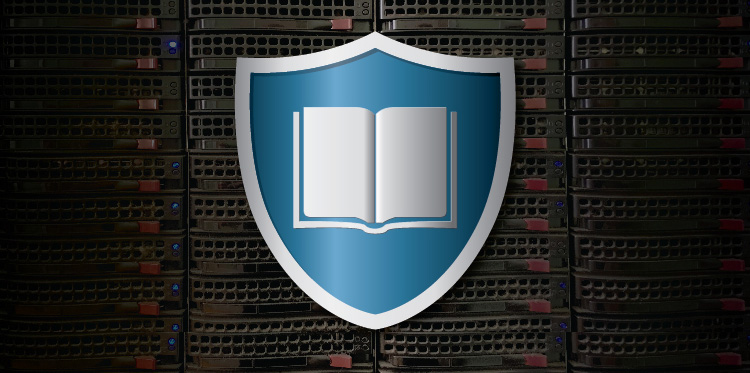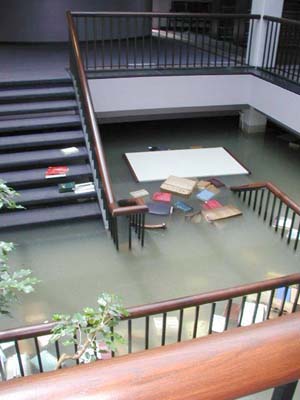

University of Houston Law Library
Michelle Wu began working at the University of Houston Law Library in the wake of flooding from Tropical Storm Allison in 2001. Some parts of the city had 14 feet of water and the library took in at least 8 feet. Law books on the lower level were underwater and the lingering humidity produced mold that destroyed much of the remaining collection.

“I wanted to create a model that would allow libraries to be able to preserve collections while respecting copyright in a world where natural disasters are a growing threat,” said Wu, now associate dean for library services and professor of law at the Georgetown Law Library in Washington, D.C. “Digitizing a collection and storing it under existing standards ensures that there is always a backed-up copy somewhere. During and after any disaster, the user would never lose access and the government would not have to reinvest to rebuild collections.” Controlled Digital Lending–the digital equivalent of traditional library lending–is a model that achieves these purposes.
For libraries with fewer resources, CDL can also be a tool to maximize public dollars and improve access. Once a library determines that its community no longer has a need for a certain CDL book (or as many copies as owned), the extra copies can be shared with libraries that never had access and would never have access without collaborative efforts.
“It’s a way of wealth sharing without much cost to communities,” Wu said. “Storage,
digitization, and system costs would have already been budgeted by the lending library, CDL requires no shipping costs to be paid by either party, and the lending library’s community won’t feel the loss of copies as local need has decreased.”
“It’s a way to build a more robust collection for all of us to use. It helps the community and
society at large in the long term,” said Wu. “That’s not something any of us can do alone. The only way we will do it is if we do it together.”
A great and interesting blog
It’s hard to find well-informed people about this subject,
but you seem like you know what you’re talking about! Thanks
Gotta say, technology these days are really helpful. In the past, when paying your monthly bills, you had to write checks or pay in person, nowadays, most services now accept payments through online.
Really love to see innovation.
thank you for sharing
Superb. I really enjoyed very much with this article here. Really it is an amazing article I had ever read. I hope it will help a lot for all. Thank you so much for this amazing posts and please keep update like this excellent article.thank you for sharing such a great blog with us.
Thank you for providing such a wonderful service. I have been benefited from this CDL and certainly many people around the globe where access to library is limited.
You are right. We need to apply it on world lable.
In my opinion, in today’s world that is more digitized.
This method will be very effective.
Thanks for your nice post
Great idea in making a digital backup so that students can still access the book.
Well, I’m a 90’s kid. Seeing what technology can do nowadays is like magic to me. I mean look what we are achieving nowadays new planets every day.
Paper books still have some useful uses, we have to do something to protect it from distinction, people now usually use technology to read but it will have some specific to eyes and brains. Hope this will work .
A case study in not backing up media content occurred in the early years of videotape for professional use. Early video tape was bulky, 2 inch Qudraflex tape on a 12 inch reel, weighing 30 lbs. It could record one or two hours of NTSC and PAL format TV. While a tape was more expensive than 16mm that had been in use, the selling point was that the tape could be wiped clean and used many times. The Monty Python BBC TV programs were almost lost, but an editor at the BBC called Terry Jones, who bought the tapes and took them home. Many other programs over the years were lost just like the many live TV programs in the early years. I for one would find the world a much poorer place without things like the Dead Parrot sketch, Confuse-a-Cat, the Argument Clinic, and the ever-unexpected Spanish Inquisition.
thank you
That is what I was explain we must have and find the way to protect books especially when fetch materials for developing projects. I known Universities are authorized apart from,we must have congress for renovation of library this will show new approval with secured management. The more draining of articles in library, the less value In original file. Otherwise we should agree with CC and MIT about how to certificates not to any body plus unknown. Thanks a lot .
People,communities, companies and developers like me should be recognised in case of any liking of articles should be approved, although it is free for anybody, but mishandling is the issues to concern thanks.